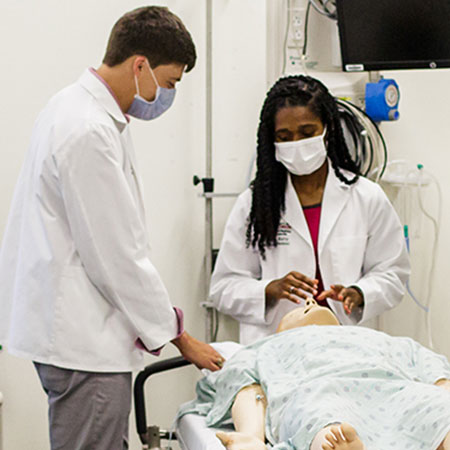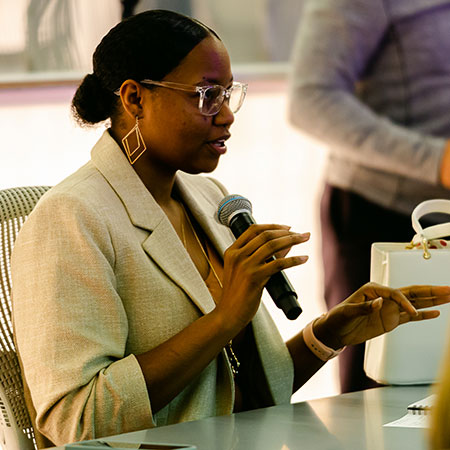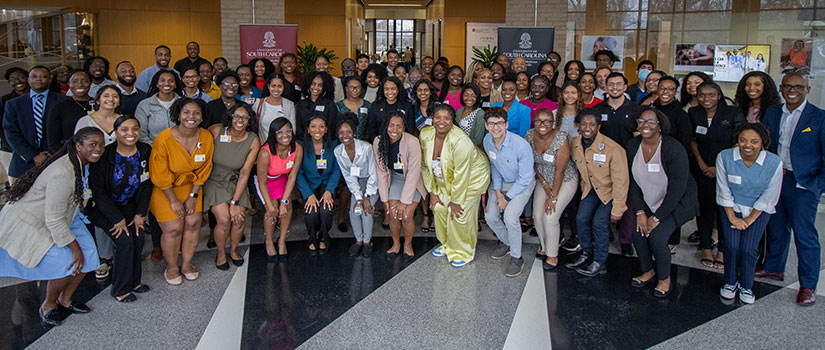Pathway Programs
-

PreMed Partners Pathway
The USC School of Medicine Greenville launched a three-year program to better prepare South Carolina college students from underserved populations for medical school. Your training will include courses, exposure to medical professionals, test preparation and summer learning.
-

MedEx Academy
Prisma Health annually offers the MedEx Academy, a health care career exploratory program for high school and college students.
Student Affinity Groups / Organizations
APAMSA at the USCSOMG, founded in 2020, serves to promote the dissemination of information relative to Asian Pacific American issues in the field of medical education; to explore and possibly resolve the unique challenges, obstacles, and responsibilities specific to Asian Pacific American medical students and physicians; to provide opportunities for Asian Pacific American medical students to give back to their community(i.e.) through service; to represent Asian Pacific Americans as a group within our health care community; to be a resource for information on matters related to Asian Pacific Americans; to provide a forum for discussion of issues concerning Asian Pacific Americans in health care; and to provide a link between students and faculty of Asian Pacific American background.
The Global Health Interest Group aims to promote student interest in health advocacy and aid for the developing world. In addition to providing lunch-and-learns, this year our group aims to increase fundraising for global health relief and volunteering.
The mission of the Latino Medical Student Association (LMSA) is to "unite and empower Latino (and non-Latino) medical students through service, mentorship, and education to advocate for the health of the Latino community." As such, we hope to engage and empower Greenville County's Latino community through volunteerism, advocacy, and health promotion, among other things. Furthermore, LMSA plans on pairing with several organizations that share our goal in order to more actively and holistically improve the lives of those we serve.
The purpose of the LGBTQ interest group is to promote the health and well-being of LGBTQ patients by educating future and current healthcare providers via focus groups, panel discussions, literature reviews and/or other events. The group aims to foster healthy dialogue between colleagues of all backgrounds in an effort to advance health equity for LGBTQ patients.
Student National Medical Association (SNMA) is committed to supporting current and future underrepresented medical students, addressing the needs of underserved communities, and increasing the number of clinically excellent, culturally competent and socially conscious physicians.
SWiM was formed at the University of South Carolina Greenville School of Medicine to create a presence of students, both male and female, who recognize the unique challenges females face within the field of medicine both as medical providers and patients. With this in mind, SWiM aims to educate and mentor future providers in tackling these challenges. They also hope to establish an environment that strives to better support women in medicine, especially medical students who are just beginning their careers, so that they feel empowered and never limit themselves.
The purpose of the MSHA it to provide a platform for the promotion of equitable healthcare for all. They seek to provide opportunities for diverse individuals to engage with the understanding that we are to treat all people in accordance with their needs and desires as they actually are and not merely as we perceive them. Furthermore, they provide an opportunity for members to explore the social, economic, and policy issues that influence the health and well being of our community.
The Student Advocates for Diversity, Inclusion, and Equity (SADIE) exists as a body of welcoming students, faculty and staff committed to: advancing the integration of diversity and inclusion within the medical school’s curriculum; supporting those student organizations with an emphasis on diversity; and fostering an environment for meaningful discussions centered on diversity and inclusion at USC School of Medicine Greenville. The students serving on this committee will be utilized as a conduit for medical students of any race, creed, ethnic background, ability, sexual orientation or gender identity to express themselves in a safe and supportive setting.
Diversity Education
Health care is changing, and the patient populations of tomorrow will be the most diverse in United States history. At the University of South Carolina School of Medicine Greenville, we want to ensure that our students have the skills and confidence to provide compassionate, high-quality care to meet each patient’s unique needs while also recognizing the broader societal and healthcare system patterns that can impact the health of various people differently.
To that end, our curriculum has been carefully designed to prepare students to work effectively on an individual and system level with patients from every socioeconomic status, cultural background, belief system, life experience and beyond. This includes the longitudinal Integrated Practice of Medicine course which includes core topics of justice, equity, diversity, and inclusion. This also includes mentored, student-led scholarly projects focused on health equity, inclusive medical education, and community-based participatory research.
Specifically, the following instructional areas have been methodically integrated throughout the medical school curriculum:
- The manner in which people of diverse cultures and belief systems perceive health and illness and respond to various symptoms, diseases and treatments
- The basic principles of culturally competent health care
- The recognition and development of equitable solutions to mitigate healthcare disparities
- The importance of meeting the healthcare needs of medically-underserved populations
- The development of core professional attributes (e.g., altruism, accountability) needed to provide effective care in a multidimensional and diverse society
- How policy, structures, and social and economic factors relate to healthcare delivery and patient outcomes
Additionally, because first-year medical students are trained to serve as Emergency Medical Technicians (EMT), students have the opportunity to encounter patients in the community from various walks of life and participate in the onsite emergency care for these patients. Students are encouraged through a variety of learning experiences to make connections between what they see and experience in the community during their EMT service and social determinants of health. Their time as EMTs helps reinforce the topics taught in the classroom and gives our students a fuller perspective of the diversity of patients they will work with as residents and physicians.
